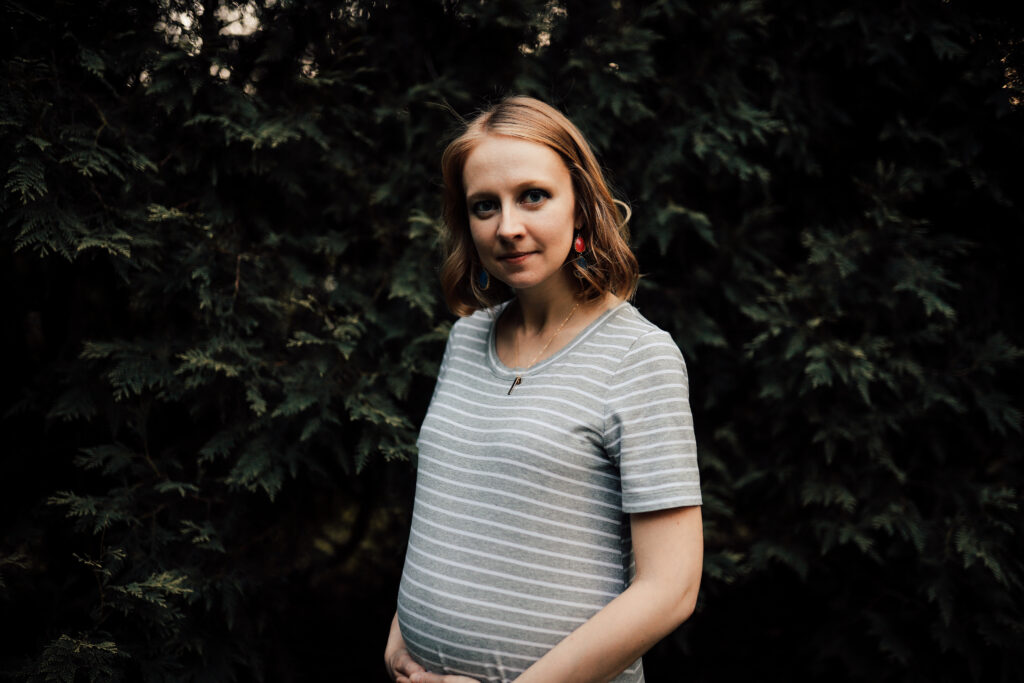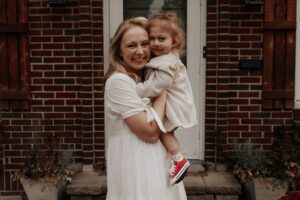The doctor and the resident shared the official diagnosis with us. I heard it, but it was like the doctor spoke another language. Holoprosencephaly is a long word that I asked him to repeat several times. The resident finally wrote it down on a piece of mini notepad paper, and I still have the piece of paper tucked away in a folder. The doctor spoke kindly and softly as he explained the next steps and options. The cause of Eloise’s holoprosencephaly would likely determine her prognosis. Half of cases are due to Trisomy 13 and the other half are attributed to some other genetic anomaly. I could have blood work done for genetic testing and/or I could get an amniocentesis to aid in determining the cause. Holoprosencephaly is considered a lethal diagnosis, so I could also choose to terminate the pregnancy. When the doctor said the word lethal, I thought he said legal. I heard “She has a legal diagnosis.” I’m the kind of person who smiles in uncomfortable or confusing situations, so I smiled. At the same time, the resident handed me a box of tissues as the doctor delivered the lethal, incompatible with life bombshell, and my brain quickly caught up. I did not cry and sat awkwardly holding a tissue.
Some people have said to us, “Thank you for choosing life,” both before and after Eloise was born. I think it’s meant as a compliment, but it’s a phrase that irks me. How am I supposed to answer? You’re welcome? My pleasure? Eloise is not a pro-life beacon; she is a child. And I am not a hero for carrying my pregnancy to term. Others like to ask bluntly, “Were you offered an abortion?” I’ve come to recognize that this question is only asked with undertones of judgment. Judgment on both ends of the spectrum. Judgment toward the doctor for having the audacity to offer an abortion. Judgment toward me for choosing to carry a pregnancy and put my daughter through so much suffering because wouldn’t our lives be easier had I chosen to terminate? It’s exhausting to engage in these conversations because I feel like the comment maker or question asker wants something more from me, and I can never quite give the answer they’re looking for.
Our decision to carry to term was a decision made between us and the doctor. I was not thinking in terms of pro-life or pro-choice. I was not taking a political stand. In that split second decision, when I told the doctor, “No, I will continue with my pregnancy,” I don’t think I even prayed. I had just witnessed my daughter moving on the screen, I heard her heartbeat, and I could feel her kicks. For as long as it was safe for both me and Eloise, I wanted to carry her. I wanted to meet my baby and give her a chance to live. I am proud of myself for choosing to carry a baby whose outcome was totally unknown. It’s the hardest thing I’ve ever done and also my greatest accomplishment.
It’s impossible to know what you would do until you’re in this position – smiling awkwardly, mistaking words, holding an unused tissue because the resident expected you to cry. Zach and I made our decision knowing that we had a great support system, stable jobs, and a loving home. In addition, much was unknown regarding the cause of Eloise’s holoprosencephaly. The blood work panel indicated abnormal results, and I opted not to have an amniocentesis. We did not find out the cause until after Eloise was born. I am forever grateful the doctor answered with “I don’t knows” rather than with certainty that she would not survive.
If the doctor had provided us with different information or if lives were endangered, I don’t know that we would have made the same decision. I firmly believe that any mother who is put in this situation is doing the best they can with the information they have. The decision to carry or terminate a pregnancy after receiving a lethal diagnosis is deeply personal and incredibly nuanced. But boy, is there a lot of judgment from others who think they know what they would do if ever put it in this impossible situation.
Throughout my pregnancy and even now when I’m asked these questions or when people make these comments, I always think:
- It’s none of your business, and
- you are missing the point.
The things we thought we had — a great support system, stable jobs, and a loving home — have shifted and changed. Our support system includes new friends and a therapist, I quit a job I loved to stay home with Eloise, and raising a child with disabilities is not easy on a marriage. Zach and I love each other and Eloise so much, and we are committed to our marriage, but of course, we’ve had moments when we experience grief and handle stress differently. Plain and simple, I think what we needed in the time after we received the diagnosis, and honestly what we continue to need, are authentic people who are willing to sit in the trenches with us. It’s not only dropping off a meal, but continuing to text and then reaching out again even when we don’t respond. It’s crying with us. It’s listening without offering a solution. It’s chatting about both lighthearted and heavy topics. It’s treating Eloise like a little girl.
We have a lot of friends who are in the trenches with us. Some have only stayed in the trenches for a period of time, others have been steady in their care for my family, and new friends have entered the trenches alongside us. The day of the anatomy scan, when we didn’t yet know the specifics of Eloise’s diagnosis, we had plans to watch The Bachelorette with our friends in the evening. Zach and I decided to go over to their house for dinner beforehand and share the news. They sympathized with us over dinner, asked us thoughtful questions, and then we watched The Bachelorette, an absolutely mind-numbing and silly show. I remember feeling angry toward Hannah Brown and thinking her issues with Luke P. were ridiculous in comparison to what we were going through. Our friends listened to me mutter under my breath throughout the episode. These are the same friends, who earlier this year, invited us over for dinner and made accommodations so that Zach and I could each go separately. We didn’t want to take Eloise to a dinner indoors, so I went one night while Zach stayed home with Eloise and then we flip flopped the next week. This is a beautiful picture of friendship.
Learning Eloise’s diagnosis was an experience that changed our lives and continues to shape our lives. It was about so much more than a choice to carry to term, but, sadly, our experience is sometimes reduced to this decision. If I’m being transparent, I hesitated sharing this post because I thought, “Am I just doing the same thing? Making this about our decision to carry to term?” What I want people to understand is that we are real people living a real life. We’re not available to answer insensitive questions or be a beacon for what others think we stand for.
An entire experience cannot be reduced to a single decision, nor should people be reduced to a single decision. Decisions are stagnant while experiences are ever evolving. Our decision to carry to term was simply a sentence in our book on parenthood, and I want others to get to know our story in its entirety.


